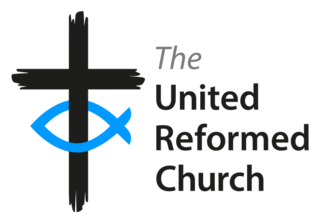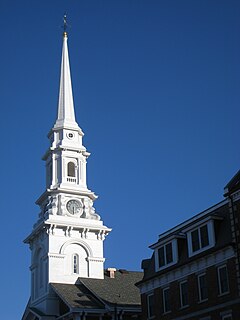Congregational churches are Protestant churches in the Reformed tradition that practise congregationalist polity.
Congregational church may also refer to:
Congregationalist polity, or congregational polity, often known as congregationalism, is a system of ecclesiastical polity in which every local church congregation is independent, ecclesiastically sovereign, or "autonomous". Its first articulation in writing is the Cambridge Platform of 1648 in New England.

The United Reformed Church (URC) is a Protestant Christian church in the United Kingdom. It has approximately 46,500 members in 1,383 congregations with 608 active ministers, including 13 church related community workers.

Congregational churches are Protestant churches in the Calvinist tradition practising congregationalist church governance, in which each congregation independently and autonomously runs its own affairs.

The United Church of Christ (UCC) is a mainline Protestant Christian denomination based in the United States, with historical and confessional roots in the Congregational, Calvinist, Lutheran, and Anabaptist traditions, and with approximately 4,852 churches and 802,356 members. The United Church of Christ is a historical continuation of the General Council of Congregational Christian churches founded under the influence of New England Pilgrims and Puritans. Moreover, it also subsumed the third largest Calvinist group in the country, the German Reformed. The Evangelical and Reformed Church and the General Council of the Congregational Christian Churches united in 1957 to form the UCC. These two denominations, which were themselves the result of earlier unions, had their roots in Congregational, Lutheran, Evangelical, and Reformed denominations. At the end of 2014, the UCC's 5,116 congregations claimed 979,239 members, primarily in the U.S. In 2015, Pew Research estimated that 0.4 percent, or 1 million adult adherents, of the U.S. population self-identify with the United Church of Christ.
Church of Christ may refer to:

A united church, also called a uniting church, is a church formed from the merger or other form of church union of two or more different Protestant Christian denominations.

The Church of South India (CSI) is a united Protestant Church, being the second-largest Christian church in India based on the number of members; it is the result of union of a number of Protestant churches in South India.
The Congregational Christian Churches were a Protestant Christian denomination that operated in the U.S. from 1931 through 1957. On the latter date, most of its churches joined the Evangelical and Reformed Church in a merger to become the United Church of Christ. Others created the National Association of Congregational Christian Churches or joined the Conservative Congregational Christian Conference that formed earlier in 1945. During the forementioned period, its churches were organized nationally into a General Council, with parallel state conferences, sectional associations, and missionary instrumentalities. Congregations, however, retained their local autonomy and these groups were legally separate from the congregations.

The Cambridge Platform is a statement describing the system of church government in the Congregational churches of colonial New England. It was written in 1648 in response to Presbyterian criticism and in time became regarded as the religious constitution of Massachusetts. The platform explained and defended congregational polity as practiced in New England and also endorsed most of the Westminster Confession of Faith. The document was shaped most directly by the thinking of Puritan ministers Richard Mather and John Cotton.
A local church is a church or congregation meeting in a particular location.
The National Association of Congregational Christian Churches (NACCC) is an association of about 400 churches providing fellowship for and services to churches from the Congregational tradition. The Association maintains its national office in Oak Creek, Wisconsin, a suburb of Milwaukee. The body was founded in 1955 by former clergy and laypeople of the Congregational Christian Churches in response to that denomination's pending merger with the Evangelical and Reformed Church to form the United Church of Christ in 1957.
Ecclesiastical polity is the operational and governance structure of a church or of a Christian denomination. It also denotes the ministerial structure of a church and the authority relationships between churches. Polity relates closely to ecclesiology, the study of doctrine and theology relating to church organization.
The Conservative Congregational Christian Conference is an evangelical Protestant Christian denomination in the United States.

The Evangelical Association of Reformed and Congregational Christian Churches is a fellowship of conservative evangelical Protestant Christian congregations in the United States that became disaffected from the United Church of Christ due to that denomination's national entities professing support for practices such as abortion and homosexuality. Unlike other more sectarian churches, the Evangelical Association does not forbid its member congregations to simultaneously belong to other denominations and fellowships, as the local churches continue to practice congregational polity.
The Plan of Union of 1801 was an agreement between the Congregational churches of New England and the Presbyterian Church in the United States of America for mutual support and joint effort in evangelizing the American frontier. It lasted until 1852.
Congregationalism refers to Congregationalist polity, a form of church governance based on the local congregation.
The Kansas City Statement of Faith is a 1913 confession of faith adopted by the National Council of the Congregational Churches of the United States at Kansas City, Missouri. This concise statement of Congregational beliefs restates traditional congregational polity and endorses ecumenism, while also displaying the drift away from Reformed theology that had occurred in American Congregationalism.
The General Synod of the United Church of Christ is the national decision-making body for the denomination, responsible for giving general direction to the evangelistic, missionary, and justice programs of the UCC. Because the UCC holds to an explicitly congregational polity, though, any decisions made by the Synod are not binding upon the UCC's congregations in any way, though the national offices and the UCC's Constitution and Bylaws expect serious consideration to be given them. The Synod is the legal successor the General Council of the Congregational Christian Churches and the General Synod of the Evangelical and Reformed Church. The Synod is responsible for authorizing budgets and electing board members for the "Covenanted Ministries" of the UCC; those agencies have evolved over the years from a number of separate entities, with different organizational structures, into a more coordinated configuration in order to serve the denomination more efficiently. The home and international missions agencies in particular were the descendants of Congregationalist boards founded in the 19th century; they were "recognized" when the UCC began during the period between 1957 and 1961. The Synod usually makes pronouncements and passes resolutions on social and political issues judged to be of concern by delegates as well; most if not all have historically reflected liberal theological and political perspectives, including support for civil rights, feminism, environmentalism, and rights for homosexuals.
The National Council of Congregational Churches of the United States was a mainline Protestant, Christian denomination in the United States. Its organization as a denomination was delayed by the Civil War. Congregational leaders met again in Boston, Massachusetts in 1865, where they began to hammer out standards of church procedures (polity) and adopted a statement of faith, known as the Burial Hill Declaration. Denominational organization came in 1871 with formation of the National Council of Congregational Churches, which existed until its merger in 1931. In 1928, there were 5,497 Congregational churches in the U.S. with a membership of 939,130. These churches were served by 5,648 ministers.

Congregationalism in the United States consists of Protestant churches in the Reformed tradition that have a congregational form of church government and trace their origins mainly to Puritan settlers of colonial New England. Congregational churches in other parts of the world are often related to these in the United States due to American missionary activities.